Fleurs du Mal Magazine


Or see the index
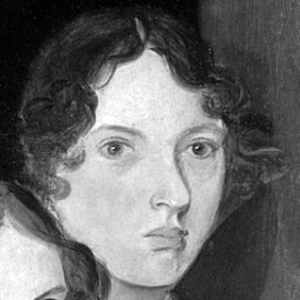
To a Wreath of Snow
O transient voyager of heaven!
O silent sign of winter skies!
What adverse wind thy sail has driven
To dungeons where a prisoner lies?
Methinks the hands that shut the sun
So sternly from this morning’s brow
Might still their rebel task have done
And checked a thing so frail as thou.
They would have done it had they known
The talisman that dwelt in thee,
For all the suns that ever shone
Have never been so kind to me!
For many a week, and many a day
My heart was weighed with sinking gloom
When morning rose in mourning grey
And faintly lit my prison room
But angel like, when I awoke,
Thy silvery form so soft and fair
Shining through darkness, sweetly spoke
Of cloudy skies and mountains bare;
The dearest to a mountaineer
Who, all life long has loved the snow
That crowned her native summits drear,
Better, than greenest plains below.
And voiceless, soulless, messenger
Thy presence waked a thrilling tone
That comforts me while thou art here
And will sustain when thou art gone
Emily Brontë
(1818 – 1848)
To a Wreath of Snow
• fleursdumal.nl magazine
More in: # Classic Poetry Archive, 4SEASONS#Winter, Archive A-B, Archive C-D, Brontë, Anne, Emily & Charlotte

Music on Christmas Morning
‘Music I love – but never strain
Could kindle raptures so divine,
So grief assuage, so conquer pain,
And rouse this pensive heart of mine –
As that we hear on Christmas morn,
Upon the wintry breezes born.
Though Darkness still her empire keep,
And hours must pass, ere morning break;
From troubled dreams, or slumbers deep,
That music kindly bids us wake:
It calls us, with an angel’s voice,
To wake, and worship, and rejoice;
To greet with joy the glorious morn,
Which angels welcomed long ago,
When our redeeming Lord was born,
To bring the light of Heaven below;
The Powers of Darkness to dispel,
And rescue Earth from Death and Hell.
While listening to that sacred strain,
My raptured spirit soars on high;
I seem to hear those songs again
Resounding through the open sky,
That kindled such divine delight,
In those who watched their flocks by night.
With them – I celebrate His birth –
Glory to God, in highest Heaven,
Good will to men, and peace on Earth,
To us a saviour-king is given;
Our God is come to claim His own,
And Satan’s power is overthrown!
A sinless God, for sinful men,
Descends to suffer and to bleed;
Hell must renounce its empire then;
The price is paid, the world is freed.
And Satan’s self must now confess,
That Christ has earned a Right to bless:
Now holy Peace may smile from heaven,
And heavenly Truth from earth shall spring:
The captive’s galling bonds are riven,
For our Redeemer is our king;
And He that gave his blood for men
Will lead us home to God again.’
Anne Brontë
(1820 – 1849)
Music on Christmas Morning (1843)
Anne Brontë (1820 – 1849) was an English novelist and poet, the youngest member of the Brontë literary family. Charlotte (1816–1855) and Emily Brontë (1818–1848) were her sisters.
• fleursdumal.nl magazine
More in: Anne, Emily & Charlotte Brontë, Archive A-B, Archive A-B, Brontë, Anne, Emily & Charlotte

A Death-scene
“O day! he cannot die
When thou so fair art shining!
O Sun, in such a glorious sky,
So tranquilly declining;
He cannot leave thee now,
While fresh west winds are blowing,
And all around his youthful brow
Thy cheerful light is glowing!
Edward, awake, awake–
The golden evening gleams
Warm and bright on Arden’s lake–
Arouse thee from thy dreams!
Beside thee, on my knee,
My dearest friend, I pray
That thou, to cross the eternal sea,
Wouldst yet one hour delay:
I hear its billows roar–
I see them foaming high;
But no glimpse of a further shore
Has blest my straining eye.
Believe not what they urge
Of Eden isles beyond;
Turn back, from that tempestuous surge,
To thy own native land.
It is not death, but pain
That struggles in thy breast–
Nay, rally, Edward, rouse again;
I cannot let thee rest!”
One long look, that sore reproved me
For the woe I could not bear–
One mute look of suffering moved me
To repent my useless prayer:
And, with sudden check, the heaving
Of distraction passed away;
Not a sign of further grieving
Stirred my soul that awful day.
Paled, at length, the sweet sun setting;
Sunk to peace the twilight breeze:
Summer dews fell softly, wetting
Glen, and glade, and silent trees.
Then his eyes began to weary,
Weighed beneath a mortal sleep;
And their orbs grew strangely dreary,
Clouded, even as they would weep.
But they wept not, but they changed not,
Never moved, and never closed;
Troubled still, and still they ranged not–
Wandered not, nor yet reposed!
So I knew that he was dying–
Stooped, and raised his languid head;
Felt no breath, and heard no sighing,
So I knew that he was dead.
Emily Brontë
(1818-1848)
poetry
fleursdumal.nl magazine
More in: Archive A-B, Brontë, Anne, Emily & Charlotte, In Memoriam
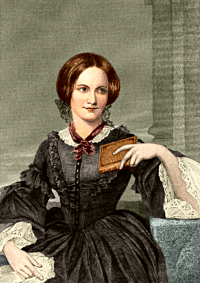
Presentiment
“Sister, you’ve sat there all the day,
Come to the hearth awhile;
The wind so wildly sweeps away,
The clouds so darkly pile.
That open book has lain, unread,
For hours upon your knee;
You’ve never smiled nor turned your head;
What can you, sister, see?”
“Come hither, Jane, look down the field;
How dense a mist creeps on!
The path, the hedge, are both concealed,
Ev’n the white gate is gone
No landscape through the fog I trace,
No hill with pastures green;
All featureless is Nature’s face.
All masked in clouds her mien.
“Scarce is the rustle of a leaf
Heard in our garden now;
The year grows old, its days wax brief,
The tresses leave its brow.
The rain drives fast before the wind,
The sky is blank and grey;
O Jane, what sadness fills the mind
On such a dreary day!”
“You think too much, my sister dear;
You sit too long alone;
What though November days be drear?
Full soon will they be gone.
I’ve swept the hearth, and placed your chair,.
Come, Emma, sit by me;
Our own fireside is never drear,
Though late and wintry wane the year,
Though rough the night may be.”
“The peaceful glow of our fireside
Imparts no peace to me:
My thoughts would rather wander wide
Than rest, dear Jane, with thee.
I’m on a distant journey bound,
And if, about my heart,
Too closely kindred ties were bound,
‘Twould break when forced to part.
“‘Soon will November days be o’er:’
Well have you spoken, Jane:
My own forebodings tell me more–
For me, I know by presage sure,
They’ll ne’er return again.
Ere long, nor sun nor storm to me
Will bring or joy or gloom;
They reach not that Eternity
Which soon will be my home.”
Eight months are gone, the summer sun
Sets in a glorious sky;
A quiet field, all green and lone,
Receives its rosy dye.
Jane sits upon a shaded stile,
Alone she sits there now;
Her head rests on her hand the while,
And thought o’ercasts her brow.
She’s thinking of one winter’s day,
A few short months ago,
Then Emma’s bier was borne away
O’er wastes of frozen snow.
She’s thinking how that drifted snow
Dissolved in spring’s first gleam,
And how her sister’s memory now
Fades, even as fades a dream.
The snow will whiten earth again,
But Emma comes no more;
She left, ‘mid winter’s sleet and rain,
This world for Heaven’s far shore.
On Beulah’s hills she wanders now,
On Eden’s tranquil plain;
To her shall Jane hereafter go,
She ne’er shall come to Jane!
Charlotte Brontë
(1816-1855)
poetry
fleursdumal.nl magazine
More in: Archive A-B, Archive A-B, Brontë, Anne, Emily & Charlotte
Male literary friendships are the stuff of legend; think Byron and Shelley, Fitzgerald and Hemingway.  But the world’s best-loved female authors are usually mythologized as solitary eccentrics or isolated geniuses.
But the world’s best-loved female authors are usually mythologized as solitary eccentrics or isolated geniuses.
Coauthors and real-life friends Emily Midorikawa and Emma Claire Sweeney prove this wrong, thanks to their discovery of a wealth of surprising collaborations: the friendship between Jane Austen and one of the family servants, playwright Anne Sharp; the daring feminist author Mary Taylor, who shaped the work of Charlotte Bronte; the transatlantic friendship of the seemingly aloof George Eliot and Harriet Beecher Stowe; and Virginia Woolf and Katherine Mansfield, most often portrayed as bitter foes, but who, in fact, enjoyed a complex friendship fired by an underlying erotic charge.
Through letters and diaries that have never been published before, A Secret Sisterhood resurrects these forgotten stories of female friendships. They were sometimes scandalous and volatile, sometimes supportive and inspiring, but always–until now–tantalizingly consigned to the shadows.
Emily Midorikawa’s work has been published in the Daily Telegraph, the Independent on Sunday, and the Times. She is a winner of the Lucy Cavendish Fiction Prize and was a runner-up in the SI Leeds Literary Prize (judged by Margaret Busby) and the Yeovil Literary Prize (judged by Tracy Chevalier). She has a history degree from University College London, and is a graduate of the University of East Anglia’s creative writing masters program. She now teaches at New York University–London.
A Secret Sisterhood:
The Literary Friendships of Jane Austen, Charlotte Brontë, George Eliot, and Virginia Woolf
by Emily Midorikawa (Author), Emma Claire Sweeney (Author), Margaret Atwood (Foreword)
Hardcover, 352 pages
Publication: October 2017
by Houghton Mifflin Harcourt
ISBN 054488373X
(ISBN13: 9780544883734)
fleursdumal.nl magazine
More in: - Book News, - Bookstores, Archive M-N, Art & Literature News, Austen, Jane, Austen, Jane, Brontë, Anne, Emily & Charlotte, Eliot, George, Mansfield, Katherine, Mansfield, Katherine, Virginia Woolf, Woolf, Virginia
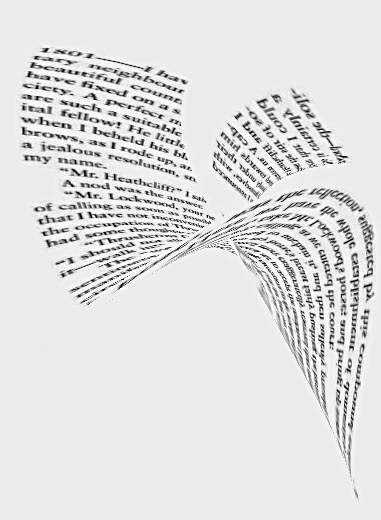
Mathias Jansson ©: From the series Impossible Literature Universe.
Wuthering Heights by Emily Bronte
Mathias Jansson is a Swedish art critic and poet. He has contributed to visual poetry to magazines as Lex-ICON, Anatematiskpress, Quarter After #4 and Maintenant 8: A Journal of Contemporary Dada. He also published a chapbook with visual poetry and contributed with erasure poetry to anthologies from Silver Birch Press.
fleursdumal.nl magazine
More in: Brontë, Anne, Emily & Charlotte, Jansson, Mathias, Mathias Jansson, Mathias Jansson
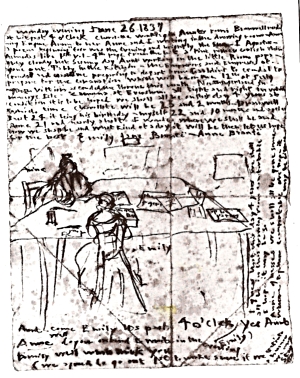 The Brontë Society is thrilled to welcome home one of the most evocative and significant literary artefacts of the 19th century, the Brontë family’s dining table.
The Brontë Society is thrilled to welcome home one of the most evocative and significant literary artefacts of the 19th century, the Brontë family’s dining table.
The purchase of the mahogany table was made possible thanks to a grant of £580,000 from the National Heritage Memorial Fund. The table witnessed the creation of ‘Wuthering Heights’ and ‘Jane Eyre’.
# More on the website of the Brontë Society
fleursdumal.nl magazine
More in: Brontë, Anne, Emily & Charlotte, History of Britain, Museum of Literary Treasures
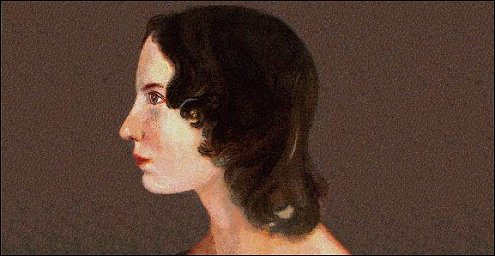
Emily Jane Brontë
(1818-1848)
Faith and Despondency
“The winter wind is loud and wild,
Come close to me, my darling child;
Forsake thy books, and mateless play;
And, while the night is gathering gray,
We’ll talk its pensive hours away;–
“Ierne, round our sheltered hall
November’s gusts unheeded call;
Not one faint breath can enter here
Enough to wave my daughter’s hair,
And I am glad to watch the blaze
Glance from her eyes, with mimic rays;
To feel her cheek, so softly pressed,
In happy quiet on my breast,
“But, yet, even this tranquillity
Brings bitter, restless thoughts to me;
And, in the red fire’s cheerful glow,
I think of deep glens, blocked with snow;
I dream of moor, and misty hill,
Where evening closes dark and chill;
For, lone, among the mountains cold,
Lie those that I have loved of old.
And my heart aches, in hopeless pain,
Exhausted with repinings vain,
That I shall greet them ne’er again!”
“Father, in early infancy,
When you were far beyond the sea,
Such thoughts were tyrants over me!
I often sat, for hours together,
Through the long nights of angry weather,
Raised on my pillow, to descry
The dim moon struggling in the sky;
Or, with strained ear, to catch the shock,
Of rock with wave, and wave with rock;
So would I fearful vigil keep,
And, all for listening, never sleep.
But this world’s life has much to dread,
Not so, my Father, with the dead.
“Oh! not for them, should we despair,
The grave is drear, but they are not there;
Their dust is mingled with the sod,
Their happy souls are gone to God!
You told me this, and yet you sigh,
And murmur that your friends must die.
Ah! my dear father, tell me why?
For, if your former words were true,
How useless would such sorrow be;
As wise, to mourn the seed which grew
Unnoticed on its parent tree,
Because it fell in fertile earth,
And sprang up to a glorious birth–
Struck deep its root, and lifted high
Its green boughs in the breezy sky.
“But, I’ll not fear, I will not weep
For those whose bodies rest in sleep,–
I know there is a blessed shore,
Opening its ports for me and mine;
And, gazing Time’s wide waters o’er,
I weary for that land divine,
Where we were born, where you and I
Shall meet our dearest, when we die;
From suffering and corruption free,
Restored into the Deity.”
“Well hast thou spoken, sweet, trustful child!
And wiser than thy sire;
And worldly tempests, raging wild,
Shall strengthen thy desire–
Thy fervent hope, through storm and foam,
Through wind and ocean’s roar,
To reach, at last, the eternal home,
The steadfast, changeless shore!”

Ellis Bell ( Emily Brontë) poetry
fleursdumal.nl magazine
More in: Anne, Emily & Charlotte Brontë, Archive A-B, Brontë, Anne, Emily & Charlotte
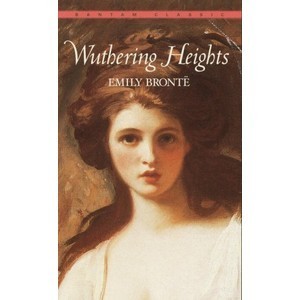
Emily Bronte
(1818-1848)
No Coward Soul Is Mine
No coward soul is mine,
No trembler in the world’s storm-troubled sphere:
I see Heaven’s glories shine,
And faith shines equal, arming me from fear.
O God within my breast,
Almighty, ever-present Deity!
Life–that in me has rest,
As I–undying Life–have Power in Thee!
Vain are the thousand creeds
That move men’s hearts: unutterably vain;
Worthless as withered weeds,
Or idlest froth amid the boundless main,
To waken doubt in one
Holding so fast by thine infinity;
So surely anchored on
The steadfast rock of immortality.
With wide-embracing love
Thy spirit animates eternal years,
Pervades and broods above,
Changes, sustains, dissolves, creates, and rears.
Though earth and man were gone,
And suns and universes ceased to be,
And Thou wert left alone,
Every existence would exist in Thee.
There is not room for Death,
Nor atom that his might could render void:
Thou–Thou art Being and Breath,
And what Thou art may never be destroyed.
Emily Jane Brontë poetry
fleursdumal.nl magazine
More in: Anne, Emily & Charlotte Brontë, Archive A-B, Brontë, Anne, Emily & Charlotte
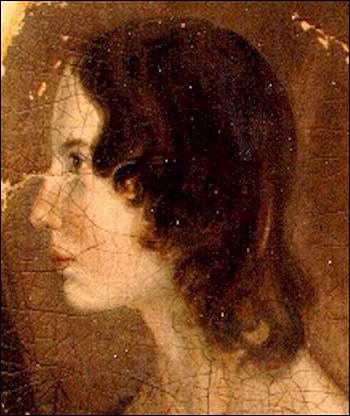
Emily Jane Brontë
(1818-1848)
Remembrance
Cold in the earth–and the deep snow piled above thee,
Far, far, removed, cold in the dreary grave!
Have I forgot, my only Love, to love thee,
Severed at last by Time’s all-severing wave?
Now, when alone, do my thoughts no longer hover
Over the mountains, on that northern shore,
Resting their wings where heath and fern-leaves cover
Thy noble heart for ever, ever more?
Cold in the earth–and fifteen wild Decembers,
From those brown hills, have melted into spring:
Faithful, indeed, is the spirit that remembers
After such years of change and suffering!
Sweet Love of youth, forgive, if I forget thee,
While the world’s tide is bearing me along;
Other desires and other hopes beset me,
Hopes which obscure, but cannot do thee wrong!
No later light has lightened up my heaven,
No second morn has ever shone for me;
All my life’s bliss from thy dear life was given,
All my life’s bliss is in the grave with thee.
But, when the days of golden dreams had perished,
And even Despair was powerless to destroy;
Then did I learn how existence could be cherished,
Strengthened, and fed without the aid of joy.
Then did I check the tears of useless passion–
Weaned my young soul from yearning after thine;
Sternly denied its burning wish to hasten
Down to that tomb already more than mine.
And, even yet, I dare not let it languish,
Dare not indulge in memory’s rapturous pain;
Once drinking deep of that divinest anguish,
How could I seek the empty world again?
.jpg)
Ellis Bell (Emily Jane Brontë) poetry
fleursdumal.nl magazine
More in: - Archive Tombeau de la jeunesse, Anne, Emily & Charlotte Brontë, Archive A-B, Brontë, Anne, Emily & Charlotte
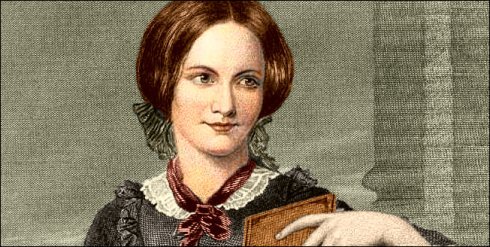
Charlotte Brontë
(1816–1855)
The Wood
But two miles more, and then we rest!
Well, there is still an hour of day,
And long the brightness of the West
Will light us on our devious way;
Sit then, awhile, here in this wood–
So total is the solitude,
We safely may delay.
These massive roots afford a seat,
Which seems for weary travellers made.
There rest. The air is soft and sweet
In this sequestered forest glade,
And there are scents of flowers around,
The evening dew draws from the ground;
How soothingly they spread!
Yes; I was tired, but not at heart;
No–that beats full of sweet content,
For now I have my natural part
Of action with adventure blent;
Cast forth on the wide world with thee,
And all my once waste energy
To weighty purpose bent.
Yet–sayst thou, spies around us roam,
Our aims are termed conspiracy?
Haply, no more our English home
An anchorage for us may be?
That there is risk our mutual blood
May redden in some lonely wood
The knife of treachery?
Sayst thou, that where we lodge each night,
In each lone farm, or lonelier hall
Of Norman Peer–ere morning light
Suspicion must as duly fall,
As day returns–such vigilance
Presides and watches over France,
Such rigour governs all?
I fear not, William; dost thou fear?
So that the knife does not divide,
It may be ever hovering near:
I could not tremble at thy side,
And strenuous love–like mine for thee–
Is buckler strong ‘gainst treachery,
And turns its stab aside.
I am resolved that thou shalt learn
To trust my strength as I trust thine;
I am resolved our souls shall burn
With equal, steady, mingling shine;
Part of the field is conquered now,
Our lives in the same channel flow,
Along the self-same line;
And while no groaning storm is heard,
Thou seem’st content it should be so,
But soon as comes a warning word
Of danger–straight thine anxious brow
Bends over me a mournful shade,
As doubting if my powers are made
To ford the floods of woe.
Know, then it is my spirit swells,
And drinks, with eager joy, the air
Of freedom–where at last it dwells,
Chartered, a common task to share
With thee, and then it stirs alert,
And pants to learn what menaced hurt
Demands for thee its care.
Remember, I have crossed the deep,
And stood with thee on deck, to gaze
On waves that rose in threatening heap,
While stagnant lay a heavy haze,
Dimly confusing sea with sky,
And baffling, even, the pilot’s eye,
Intent to thread the maze–
Of rocks, on Bretagne’s dangerous coast,
And find a way to steer our band
To the one point obscure, which lost,
Flung us, as victims, on the strand;–
All, elsewhere, gleamed the Gallic sword,
And not a wherry could be moored
Along the guarded land.
I feared not then–I fear not now;
The interest of each stirring scene
Wakes a new sense, a welcome glow,
In every nerve and bounding vein ;
Alike on turbid Channel sea,
Or in still wood of Normandy,
I feel as born again.
The rain descended that wild morn
When, anchoring in the cove at last,
Our band, all weary and forlorn
Ashore, like wave-worn sailors, cast–
Sought for a sheltering roof in vain,
And scarce could scanty food obtain
To break their morning fast.
Thou didst thy crust with me divide,
Thou didst thy cloak around me fold;
And, sitting silent by thy side,
I ate the bread in peace untold:
Given kindly from thy hand, ’twas sweet
As costly fare or princely treat
On royal plate of gold.
Sharp blew the sleet upon my face,
And, rising wild, the gusty wind
Drove on those thundering waves apace,
Our crew so late had left behind;
But, spite of frozen shower and storm,
So close to thee, my heart beat warm,
And tranquil slept my mind.
So now–nor foot-sore nor opprest
With walking all this August day,
I taste a heaven in this brief rest,
This gipsy-halt beside the way.
England’s wild flowers are fair to view,
Like balm is England’s summer dew
Like gold her sunset ray.
But the white violets, growing here,
Are sweeter than I yet have seen,
And ne’er did dew so pure and clear
Distil on forest mosses green,
As now, called forth by summer heat,
Perfumes our cool and fresh retreat–
These fragrant limes between.
That sunset! Look beneath the boughs,
Over the copse–beyond the hills;
How soft, yet deep and warm it glows,
And heaven with rich suffusion fills;
With hues where still the opal’s tint,
Its gleam of prisoned fire is blent,
Where flame through azure thrills!
Depart we now–for fast will fade
That solemn splendour of decline,
And deep must be the after-shade
As stars alone to-night will shine;
No moon is destined–pale–to gaze
On such a day’s vast Phoenix blaze,
A day in fires decayed!
There–hand-in-hand we tread again
The mazes of this varying wood,
And soon, amid a cultured plain,
Girt in with fertile solitude,
We shall our resting-place descry,
Marked by one roof-tree, towering high
Above a farmstead rude.
Refreshed, erelong, with rustic fare,
We’ll seek a couch of dreamless ease;
Courage will guard thy heart from fear,
And Love give mine divinest peace:
To-morrow brings more dangerous toil,
And through its conflict and turmoil
We’ll pass, as God shall please.
.jpg)
Currer Bell (Charlotte Brontë) poetry
fleursdumal.nl magazine
More in: Anne, Emily & Charlotte Brontë, Brontë, Anne, Emily & Charlotte
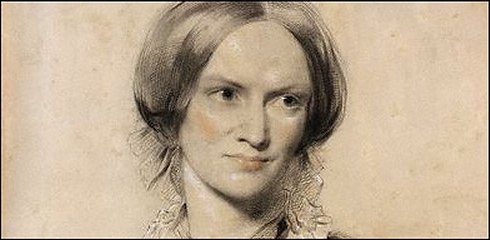
Charlotte Brontë
(1816 -1855)
The Wife’s Will
Sit still–a word–a breath may break
(As light airs stir a sleeping lake)
The glassy calm that soothes my woes–
The sweet, the deep, the full repose.
O leave me not! for ever be
Thus, more than life itself to me!
Yes, close beside thee let me kneel–
Give me thy hand, that I may feel
The friend so true–so tried–so dear,
My heart’s own chosen–indeed is near;
And check me not–this hour divine
Belongs to me–is fully mine.
‘Tis thy own hearth thou sitt’st beside,
After long absence–wandering wide;
‘Tis thy own wife reads in thine eyes
A promise clear of stormless skies;
For faith and true love light the rays
Which shine responsive to her gaze.
Ay,–well that single tear may fall;
Ten thousand might mine eyes recall,
Which from their lids ran blinding fast,
In hours of grief, yet scarcely past;
Well mayst thou speak of love to me,
For, oh! most truly–I love thee!
Yet smile–for we are happy now.
Whence, then, that sadness on thy brow?
What sayst thou? “We muse once again,
Ere long, be severed by the main!”
I knew not this–I deemed no more
Thy step would err from Britain’s shore.
“Duty commands!” ‘Tis true–’tis just;
Thy slightest word I wholly trust,
Nor by request, nor faintest sigh,
Would I to turn thy purpose try;
But, William, hear my solemn vow–
Hear and confirm!–with thee I go.
“Distance and suffering,” didst thou say?
“Danger by night, and toil by day?”
Oh, idle words and vain are these;
Hear me! I cross with thee the seas.
Such risk as thou must meet and dare,
I–thy true wife–will duly share.
Passive, at home, I will not pine;
Thy toils, thy perils shall be mine;
Grant this–and be hereafter paid
By a warm heart’s devoted aid:
‘Tis granted–with that yielding kiss,
Entered my soul unmingled bliss.
Thanks, William, thanks! thy love has joy,
Pure, undefiled with base alloy;
‘Tis not a passion, false and blind,
Inspires, enchains, absorbs my mind;
Worthy, I feel, art thou to be
Loved with my perfect energy.
This evening now shall sweetly flow,
Lit by our clear fire’s happy glow;
And parting’s peace-embittering fear,
Is warned our hearts to come not near;
For fate admits my soul’s decree,
In bliss or bale–to go with thee!
.jpg)
Currer Bell (Charlotte Brontë) poetry
fleursdumal.nl magazine
More in: - Archive Tombeau de la jeunesse, Anne, Emily & Charlotte Brontë, Archive A-B, Brontë, Anne, Emily & Charlotte
Thank you for reading Fleurs du Mal - magazine for art & literature